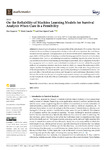Mostrar o rexistro simple do ítem
On the Reliability of Machine Learning Models for Survival Analysis When Cure Is a Possibility
| dc.contributor.author | Ezquerro, Ana | |
| dc.contributor.author | Cancela, Brais | |
| dc.contributor.author | López-Cheda, Ana | |
| dc.date.accessioned | 2023-12-22T17:18:42Z | |
| dc.date.available | 2023-12-22T17:18:42Z | |
| dc.date.issued | 2023-10-02 | |
| dc.identifier.citation | Ezquerro A, Cancela B, López-Cheda A. On the Reliability of Machine Learning Models for Survival Analysis When Cure Is a Possibility. Mathematics. 2023; 11(19):4150. https://doi.org/10.3390/math11194150 | es_ES |
| dc.identifier.issn | 2227-7390 | |
| dc.identifier.uri | http://hdl.handle.net/2183/34614 | |
| dc.description.abstract | [Abstract]: In classical survival analysis, it is assumed that all the individuals will experience the event of interest. However, if there is a proportion of subjects who will never experience the event, then a standard survival approach is not appropriate, and cure models should be considered instead. This paper deals with the problem of adapting a machine learning approach for classical survival analysis to a situation when cure (i.e., not suffering the event) is a possibility. Specifically, a brief review of cure models and recent machine learning methodologies is presented, and an adaptation of machine learning approaches to account for cured individuals is introduced. In order to validate the proposed methods, we present an extensive simulation study in which we compare the performance of the adapted machine learning algorithms with existing cure models. The results show the good behavior of the semiparametric or the nonparametric approaches, depending on the simulated scenario. The practical utility of the methodology is showcased through two real-world dataset illustrations. In the first one, the results show the gain of using the nonparametric mixture cure model approach. In the second example, the results show the poor performance of some machine learning methods for small sample sizes. | es_ES |
| dc.description.sponsorship | This project was funded by the Xunta de Galicia (Axencia Galega de Innovación) Research projects COVID-19 presented in ISCIII IN845D 2020/26, Operational Program FEDER Galicia 2014–2020; by the Centro de Investigación de Galicia “CITIC”, funded by Xunta de Galicia and the European Union European Regional Development Fund (ERDF)-Galicia 2014–2020 Program, by grant ED431G 2019/01; and by the Spanish Ministerio de Economía y Competitividad (research projects PID2019-109238GB-C22 and PID2021-128045OA-I00). ALC was sponsored by the BEATRIZ GALINDO JUNIOR Spanish Grant from MICINN (Ministerio de Ciencia e Innovación) with code BGP18/00154. ALC was partially supported by the MICINN Grant PID2020-113578RB-I00 and partial support of Xunta de Galicia (Grupos de Referencia Competitiva ED431C-2020-14). We gratefully acknowledge the support of NVIDIA Corporation with the donation of the Titan Xp GPU used for this research. | es_ES |
| dc.description.sponsorship | Xunta de Galicia; ED431G 2019/01 | es_ES |
| dc.description.sponsorship | Xunta de Galicia; ED431C-2020-14 | es_ES |
| dc.description.sponsorship | Xunta de Galicia; IN845D 2020/26 | es_ES |
| dc.language.iso | eng | es_ES |
| dc.publisher | MDPI | es_ES |
| dc.relation | info:eu-repo/grantAgreement/AEI/Plan Estatal de Investigación Científica y Técnica y de Innovación 2017-2020/PID2019-109238GB-C22/ES/APRENDIZAJE AUTOMATICO ESCALABLE Y EXPLICABLE | es_ES |
| dc.relation | info:eu-repo/grantAgreement/MICINN/Plan Estatal de Investigación Científica, Técnica y de Innovación 2021-2023/PID2021-128045OA-I00/ES/APRENDIZAJE PROFUNDO ÉTICO | es_ES |
| dc.relation | info:eu-repo/grantAgreement/MICINN/Plan Estatal de Investigación Científica y Técnica y de Innovación 2017-2020/BEAGAL18%2F00143/ES/ | es_ES |
| dc.relation | info:eu-repo/grantAgreement/AEI/Plan Estatal de Investigación Científica y Técnica y de Innovación 2017-2020/PID2020-113578RB-I00/ES/METODOS ESTADISTICOS FLEXIBLES EN CIENCIA DE DATOS PARA DATOS COMPLEJOS Y DE GRAN VOLUMEN: TEORIA Y APLICACIONES | es_ES |
| dc.relation.uri | https://doi.org/10.3390/math11194150 | es_ES |
| dc.rights | © 2023 by the authors. Licensee MDPI, Basel, Switzerland. This article is an open access article distributed under the terms and conditions of the Creative Commons Attribution (CC BY) license (https://creativecommons.org/licenses/by/4.0/). | es_ES |
| dc.rights | Atribución 4.0 Internacional | es_ES |
| dc.rights.uri | http://creativecommons.org/licenses/by/3.0/es/ | * |
| dc.subject | Censored data | es_ES |
| dc.subject | Cure rate | es_ES |
| dc.subject | Deep learning | es_ES |
| dc.subject | Mixture cure models | es_ES |
| dc.subject | Simulation | es_ES |
| dc.subject | System reliability | es_ES |
| dc.title | On the Reliability of Machine Learning Models for Survival Analysis When Cure Is a Possibility | es_ES |
| dc.type | info:eu-repo/semantics/article | es_ES |
| dc.rights.access | info:eu-repo/semantics/openAccess | es_ES |
| UDC.journalTitle | Mathematics | es_ES |
| UDC.volume | 11 | es_ES |
| UDC.issue | 19 | es_ES |
| UDC.startPage | 4150 | es_ES |
| dc.identifier.doi | 10.3390/math11194150 |
Ficheiros no ítem
Este ítem aparece na(s) seguinte(s) colección(s)
-
GI-MODES - Artigos [122]
-
GI-LIDIA - Artigos [54]






